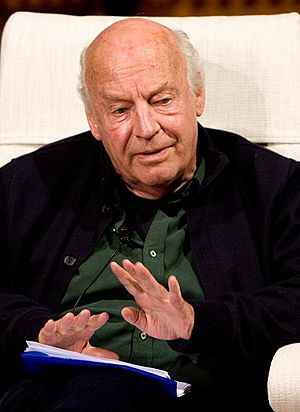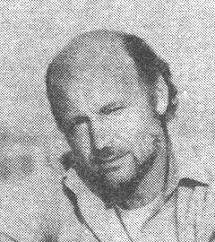Eduardo Galeano facts for kids
Quick facts for kids
Eduardo Galeano
|
|
|---|---|

Eduardo Galeano in 2012
|
|
| Born | Eduardo Germán María Hughes Galeano 3 September 1940 Montevideo, Uruguay |
| Died | 13 April 2015 (aged 74) Montevideo, Uruguay |
| Occupation | Writer, journalist |
| Spouse | Helena Villagra |
Eduardo Hughes Galeano (born September 3, 1940 – died April 13, 2015) was a famous Uruguayan journalist and writer. Many people called him a "literary giant" from Latin America.
Galeano's most well-known books are Las venas abiertas de América Latina (which means Open Veins of Latin America, published in 1971) and Memoria del fuego (meaning Memory of Fire Trilogy, published between 1982 and 1986). He once said he was a writer "obsessed with remembering" the past of Latin America.
The famous author Isabel Allende said that Open Veins of Latin America was a mix of "careful details, strong beliefs, beautiful writing, and good storytelling." She even took her copy of the book with her when she had to leave Chile in 1973.
Contents
Who Was Eduardo Galeano?
Eduardo Germán María Hughes Galeano was born in Montevideo, Uruguay, on September 3, 1940. His family had roots from different countries like Wales, Italy, Germany, and Spain. Eduardo used his mother's family name, Galeano, for his writing.
His Early Life and Career
When he was just 14 years old, Galeano started working. He had many different jobs, like being a messenger and collecting fares. He later began working at a socialist newspaper in Uruguay called El Sol.
He first published his comics there before he started writing articles. Eduardo loved drawing throughout his life. You can even see his small drawings in many of his later books. His signature often had a tiny hand-drawn pig next to it!
As a journalist in the 1960s, Galeano became very important among left-wing publications. He became the editor of Marcha, a weekly newspaper that many famous writers contributed to.
A Writer in Exile
In 1973, a military coup took over Uruguay. This meant the army took control of the government. Galeano was put in prison and then had to leave his home country. He went to Argentina, where he started a magazine called Crisis.
His 1971 book, Open Veins of Latin America, was banned by the new military governments in Uruguay, Chile, and Argentina. This meant people were not allowed to read it.
In 1976, another military government took power in Argentina. Galeano's name was put on a list of people who were in danger. So, he had to flee again, this time to Spain. While in Spain, he wrote his famous three-part book series, Memoria del fuego (Memory of Fire). This series is known for strongly criticizing how countries were colonized in the Americas.
Returning Home
In 1985, Eduardo Galeano was able to return to Montevideo, Uruguay. This happened when the country became a democracy again. He continued to write and share his thoughts on politics and society.
In 2005, a Latin American TV station called TeleSUR was created. Galeano joined its advisory committee, working with other thinkers who shared similar ideas.
In 2007, Galeano had surgery for lung cancer. He passed away on April 13, 2015, in Montevideo, at the age of 74.
His Most Famous Books
Galeano wrote many books, but two of them became especially famous around the world.
Open Veins of Latin America
Las venas abiertas de América Latina is one of Galeano's most well-known books. It tells the history of Latin America from the time of Christopher Columbus. It focuses on the story from the point of view of the people who were conquered and faced hardship.
This book became very popular in the English-speaking world after Venezuelan President Hugo Chávez gave a copy to U.S. President Barack Obama in 2009.
Football in Sun and Shadow
Eduardo Galeano was also a huge fan of football (soccer). He wrote a great book about it called Football in Sun and Shadow (El fútbol a sol y sombra). This book tells the history of the sport. It also shares Galeano's own experiences with football and his thoughts on society. Many people consider it one of the best books ever written about football.
Later Life and Legacy
Eduardo Galeano's writing style changed over time. He explored topics like freedom and slavery, and how democracies and dictatorships work. He believed that many powerful countries had spread military dictatorships around the world.
Awards and Recognition
Eduardo Galeano received several awards for his important work:
- 2006: International Human Rights Award by Global Exchange
- 2010: Stig Dagerman Prize
- 2021: Posthumous "honoris causa" prize from the National University of Misiones (given after his death).
See also
- Culture of Uruguay
- List of Uruguayan writers
- Z Communications
- In Spanish: Eduardo Galeano para niños
 | Aaron Henry |
 | T. R. M. Howard |
 | Jesse Jackson |


